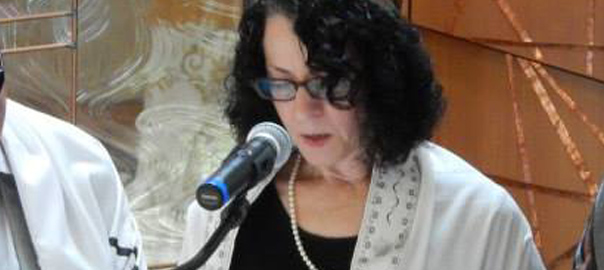Adult B’nei Mitzvah Class of 2014: Janice Wien

Shabbat shalom!
This has been a long journey! Even though both my parents were Jewish, I grew up with little more than the food and a bit of Yiddish. But I always had an iron-clad sense of Jewish identity while, at the same time, I also felt like an outsider. In my twenties I decided to figure out what being Jewish meant to me, and I’ve been on a learning path ever since. While I’ve been passionate about studying Hebrew, and Jewish history and culture, I’ve struggled with the concept of God and with religion.
I realized I wasn’t going to make real progress if I remained outside the religion looking in through a narrow window. The real struggles and rewards could only happen if I found a way to enter the room, take a seat, study the texts, and wrestle with the ideas. What better way to mark the next leg of the journey than with a bat mitzvah?
When we started the b’nei mitzvah class, I wasn’t a member of BCC. I’m happy to say I am now! But at the time, I was a “stranger” in their midst. True to the ideas in the verses I will chant, I received amazing support from classmates and teachers as we learned together and especially when my father died in April. I am deeply grateful to you all.
In Numbers 35, verses 7 and 8, the Israelite tribes are told to give a total of forty-eight cities and the surrounding pasturelands to the Levites, specifying “from the many you shall take many; and from the few you shall take few; every tribe according to its inheritance.” This idea really appealed to my inner socialist!
The verses are part of a set of instructions to the Israelites who had defined the boundaries of the promised land but not yet entered it. In preparation, they had to create a just infrastructure for living there1, including how to fairly share the support of the Levites, the tribe consecrated to God’s service and charged with the care of the Tent of Appointed Meeting with God. By extension, they were also caretakers of the community.
Since the Levites were landless, Rabbi Danny Burkman saw them as representing the homeless. They had to be given cities to live in. In addition, the land surrounding the cities was pasture land, not farm land, so the Levites depended on tithes from the community. And Deuteronomy instructs the people to tithe their crops to the Levites, the stranger, orphan, and widow because they all needed the same protections.
I also found a reference to these verses as the basis for many tax systems though history. In a 2010 interview9, Rabbi Zalman Schacter-Shalomi, sadly of blessed memory, was asked how paying taxes can be a spiritual experience. For him, someone who fled the Nazis and was interned in detention camps, America was like a country club. He was happy to pay his dues. He even wrote “thank you” on his checks to the IRS!
Now many of us may not agree with how our taxes are spent, but Reb Zalman believed people need to practice greater generosity and realize that by paying our dues and supporting those who take care of our communities as well as the disadvantaged within those communities, we are investing in ourselves.
Reb Zalman ’s viewpoint is a key to how these verses can apply to us today. However we define the “Tent”—our shul, our community, our cities of refuge, our country, environment, or planet — we are responsible for sharing in their support according to our means. This not only includes material support but also our time and energy. So as a dear friend put it, we need to ask ourselves – what have we “inherited” a lot of and what do we only have a little of? We should give generously from that of which we have much. But we should also remember to give a little from that of which we only have a little. The tribes and the Levites have long since blended together, leaving us all responsible for the common good.
Shabbat shalom!
Saturday, July 26, 2014




